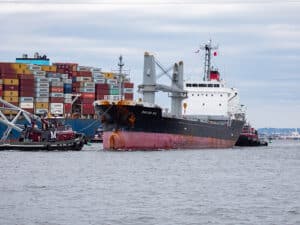
Airbus opts for e-methanol and rotor sails for new transatlantic trio
Written by Nick Blenkey
New ships are expect to cut CO2 emissions on Airbus’s transatlantic maritime operations from 68,000 to 33,000 tonnes by 2030. [Image: Airbus]
Looking to reduce its carbon footprint, Airbus is to renew it entire fleet of vessels chartered in from France’s Louis Dreyfus Armateurs (LDA) to transport aircraft subassemblies between Saint-Nazaire, France, and its single-aisle aircraft final assembly line in Mobile, Ala.
It has commissioned Louis Dreyfus to build own and operate three new RO/RO vessels. Set to enter service in 2026, each will be fitted with six rotor sails and two dual-fuel engines operating on diesel fuel and e-methanol. The percentage of e-methanol used will be stepped up in line with the availability of the green fuel. Additionally, routing software will be used to optimize the vessels’ journey across the Atlantic, maximizing wind propulsion and avoiding drag caused by adverse sea conditions.
The new fleet is expected to reduce average annual transatlantic CO2 emissions from 68,000 to 33,000 tonnes by 2030. This will contribute to Airbus’ commitment to reduce its overall industrial emissions by up to 63% by the end of the decade, compared to 2015 as a baseline year, in line with the 1.5°C pathway of the Paris Agreement.
“The renewal of our marine fleet is a major step forward in reducing our environmental impact,” said Nicolas Chrétien, head of sustainability & environment at Airbus. “The latest generation of vessels proposed by Louis Dreyfus Armateurs are more fuel efficient than their predecessors, using cutting-edge technologies like wind-assisted propulsion. This demonstrates our determination to lead the way in decarbonizing our sector by innovating not just in aviation, but across all our industrial operations.”
“We are very pleased to have been selected by Airbus to develop this state-of-the-art and low-emission fleet and to continue our longstanding partnership,” said Edouard Louis-Dreyfus, president, Louis Dreyfus Armateurs. “This new project, setting high targets, reflects our ambition regarding the decarbonization of the shipping industry. We are proud to support our customers in their energy transition, going even beyond their expectations by offering innovative solutions and sustainably driving change.”
The fleet renewal also supports Airbus’s ambition to increase A320 production rate to 75 aircraft per month by 2026. Each new transatlantic vessel will have the capacity to transport around seventy 40-foot containers and six single-aisle aircraft sub assembly sets – wings, fuselage, engine pylons, horizontal and vertical tail planes – compared to three to four sets with current cargo ships.
Currently, three vessels chartered in from LDA operate on Airbus’s two maritime routes. On the Mediterranean, the Ciudad de Cadiz makes stops at Airbus and supplier production facilities in Tunis, Naples, Porto and Saint-Nazaire. The Ville de Bordeaux and City of Hamburg cross the Atlantic. In September, LDA announced that the Ville de Bordeaux is to be retrofitted with bound4blue suction sails.
As the fleet is gradually renewed, the Ciudad de Cadiz will be retired from service. When the first of the new Airbus ships enters service in 2026, the City of Hamburg will transfer to the Mediterranean. When the second new vessel is delivered, the Ville de Bordeaux will move to the Mediterranean to replace the City of Hamburg and will continue to operate with the bound4blue eSails.




